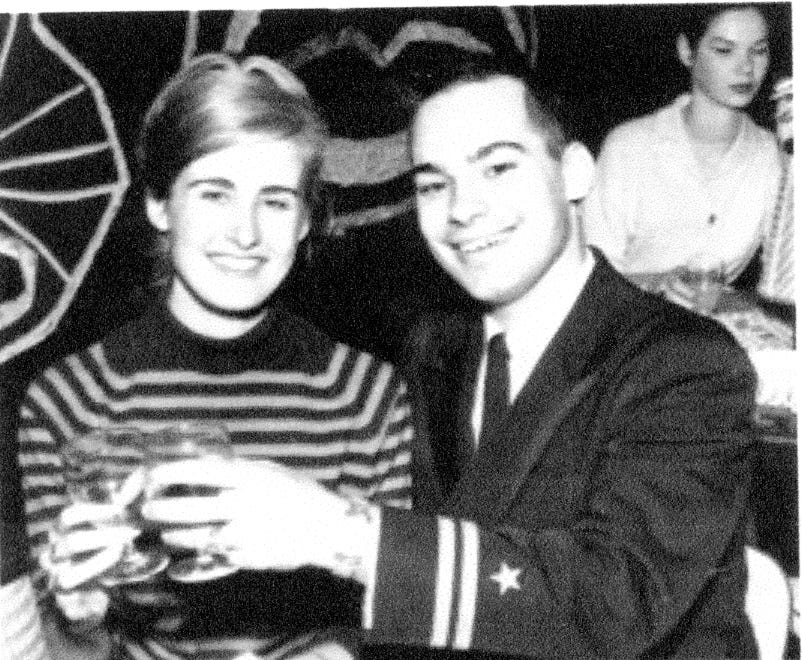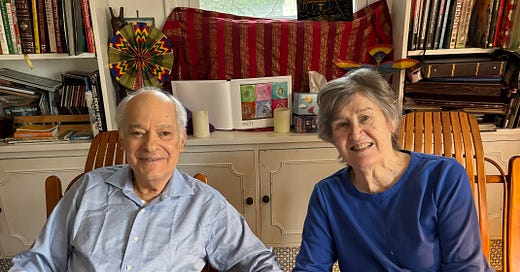Chronicle profile: Joel and Jeanette Gingold. From Croton to Sydney and back again, a whirlwind romance goes nuclear.
Retired nuclear engineer Joel Gingold has lived in Croton for more than 80 years, his editor wife Jeanette nearly 60 years. They have long been active in village politics.
Note to readers: Like all profiles of Croton people, this post is free for all readers. But local journalism needs your support. Please consider taking out a paid sub. Details below.
Joel Gingold moved to Croton with his family when he was about five years old. His father was an accountant, and his mother—after some years as a housewife—became a writer and a poet.
That was in the early 1940s. Croton was a different place back then. The building that today houses Temple Israel was a radical experimental school called Hessian Hills, and Joel attended both kindergarten and first grade there. (If he was politically indoctrinated, he does not remember.) You didn’t need a recreation card to swim at Silver Lake, and he and his friends would jump into the river there day or night. Joel had a paper route, back when newspapers were delivered by hand. And in those days, he says, pupils were afraid of the teachers, rather than the other way around.
“Nowadays, parents hire a lawyer,” he says.
Joel did well in school, especially in science and math. His senior year at Croton-Harmon High School, Elky Shatzkin, the physicist, management consultant, and political activist (and mother of affordable housing advocate Nance Shatzkin)—who often mentored Croton students—encouraged him to pursue his interests in nuclear physics.
So Joel applied and was accepted to the Rensselaer Polytechnic Institute up in Troy, landing a Navy ROTC scholarship to pay his tuition and expenses. He graduated in 1960. In those days, he says, “the Navy took people right out of school into the nuclear program.” He had an interview with the famously stern Admiral Hyman Rickover, the pioneer of naval nuclear propulsion and czar of its operations for three decades.
“I was told that whatever I did, I should not smile. He scolded me for not getting straight A’s and having a social life.” But Rickover accepted him into the program. After training in Idaho and New London, Joel was assigned to the USS Boston’s boiler division; and then, after several months, to the USS Enterprise, the first nuclear-powered aircraft carrier.
“I was 23 or 24 years old, and responsible for 90 men and tens of millions of dollars in equipment,” Joel says. He was stationed on the Enterprise for about two and a half years. But when his deployment was about to end, in 1964, Rickover pressured him into sailing on the ship’s world tour. On a stopover in Sydney, lots of locals toured the ship and celebrated the arrival of the sailors. One young woman kept coming up to Joel and asking him what the badge he was wearing on his uniform was for.
“It’s to measure radiation,” Joel told her, more than once.
The woman’s name was Jeanette.
Jeanette was from Culcairn, a little town between Sydney and Melbourne. Her father was a sheep farmer, but she was now working in the big city. Jeanette was an employment officer in Australia’s Department of Labor, and also working on a degree at Sydney University.
Joel fell hard. By then, he says, “I had asked every eligible girl in the U.S. to marry me and they had all said no.”
They had just one day together, and then Joel had to board the ship and eventually make his way back to Croton. He already had a job lined up as a nuclear engineer, the profession he would pursue all of his working life. Joel and Jeanette wrote each other often, and then Joel traveled back to Sydney to see if this was the real thing.
Jeanette was already pretty sure. “You can read a lot through letters,” she says.
They were engaged three or four days later. But when they went to apply for a visa for Jeanette to come and marry Joel in the United States, they were told that the Australian visa quota was very small and they might have to wait for 30 years. So they waited one year, spending it apart, and then Joel came back to Sydney. They were married on December 16, 1965, and Jeanette emigrated to the U.S.
Or, to be more specific, she emigrated to Croton, where she launched a career as an editor for a number of publications in the Westchester area.

As they set about raising a family, Joel and Jeanette also got active in village affairs. Croton was also different politically then. There were “wonderful community meetings,” Jeanette says, with lively discussions and debates, which usually stayed on the civil side of nasty even if they got pretty heated at times. The Republican and Democratic parties were both very active, and Republicans actually dominated the village board and mayoralty at that time.
One day, around 1971 or 1972, Joel got a call from the chair of the Croton Democrats. “You’ve been unanimously selected to be on the ticket,” the chair told Joel. All Joel could think was, “Why me?” So he called up Lou Brennan, editor of the Croton-Cortlandt News (forerunner of The Gazette) and also a local archaeologist of note.
“What the hell is going on?” Joel asked Brennan. “Do I have any chance of winning?”
“No,” Brennan replied.
And he didn’t. But Joel did become much more involved in village politics. He eventually became the treasurer of Croton United when that independent group formed, and began writing long letters to The Gazette on subjects ranging from the acquisition of Gouveia Park (against) to fiscal responsibility (in favor.) One might say he was the Paul Steinberg (frequent author of long letters to The Gazette) of his time, or as Joel prefers to put it, “Paul Steinberg is the Joel Gingold of our time.”
In describing his political views, which have long included criticism of Croton’s current Democratic Party leadership, Joel says “I’m a Democrat at every level above Croton.” Like other registered Democrats who helped found Croton United, Joel thinks that the party’s conventional wisdom might work on the national level, but not always in a small community like Croton.
He and many others think that moving village elections from March to November dampened any prospects of winning Board seats or the mayor’s spot. But even more importantly, he says, Trump’s election in 2016 was the kiss of death for Republicans and independents who had supported his candidacy.
“As long as Donald Trump exists, nobody but a Democrat will be elected in Croton,” Joel says.
Today, Joel and Jeanette live a quiet life in a house just down the road from Silver Lake, from where Joel used to swim as a boy. They still have a canoe down at the river, although they don’t use it anymore. They are active in the Croton Senior Club, enjoy visits from their adult children, and Joel still closely follows nuclear issues, including the decommissioning of Indian Point.
And Joel has become a writer, perhaps taking after his mother. After attending workshops at the Hudson Valley Writers Center in Sleepy Hollow, he wrote two books of essays and memoir: “Now Hear This” and “The Street Where I Live.”
We’ve read both of them. They’re pretty good. We recommend that you read them too.
Note to readers: We hope you enjoyed this free story. To support local journalism, please consider taking out a paid subscription. You can do that by clicking this button:
To share this story, or to share the Croton Chronicle, please click on these buttons:
Comments policy: Please always be polite and respectful.







This is a wonderful article. Joel is a wonderful person with a great history and life. All his points about Croton United, Trump and village elections are unfortunately true. It’s very sad how national politics dominated people’s ideas even when it came to small town issues. I hope this trend turns around in time to save Croton from the mayor’s nonstop push for giant apartment buildings. We need fresh blood from concerned residents. No need to worry about party affiliation or national politics. The focus should be on Croton issues solely.